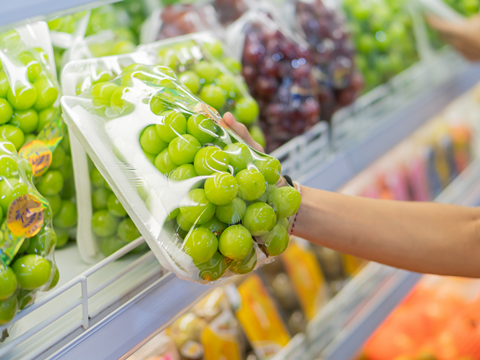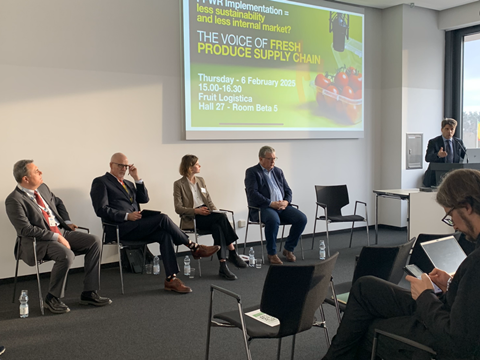
At this year’s Fruit Logistica, a panel organised by ProFood and Freshfel Europe saw European and international associations discuss a ‘pragmatic approach’ to the Packaging and Packaging Waste Regulation (PPWR) and concerns about the risk of single market fragmentation.
The discussion focused on the adoption of the PPWR, particularly the ban on plastic packaging for fruits and vegetables under 1.5 kg. The panel’s speakers believed regulation does not take into account the specificities of the fruit and vegetable sector, risking compromising product quality, increasing food waste, and creating distortions in the European single market.
ProFood representative Roberto Zanichelli opened the discussion, stating that the supply chain’s advocacy is still ongoing and there is much work to be done to ensure rational implementation of the PPWR. He presented the results of the study ‘Fruit and vegetable products and primary packaging: a preliminary study on environmental impact from field to table’, carried out by the Department of Agricultural, Forestry and Food Sciences at the University of Turin.
According to ProFood, the study - based on the Life Cycle Assessment (LCA) method - showed that rPET packaging offers better environmental performance than cardboard in terms of CO₂ emissions, land consumption, water resources, and reducing food waste along the supply chain.
“You cannot address sustainability without considering the entire product life cycle,” Zanichelli stressed. “Eliminating plastic packaging without concrete alternatives can lead to increased waste and a larger overall environmental footprint.”
Joanna Nathanson, head of Sustainability and External Relations at Freshfel Europe, spoke next, tracing the process of PPWR and highlighting how its implementation is still uncertain. “We need to ensure harmonization across European markets and regulatory certainty to enable appropriate investment,” she stated, highlighting the cost implications for companies that need to convert production lines from plastic to paper.
Massimiliano Del Core, vice president of Ortofrutta Italia, drew attention to fruit and vegetable production and distribution, presenting data collected through questionnaires addressed to product committees. His analysis showed how regulation can impact the entire value chain, from producer to end consumer, requiring a more balanced approach.

On the other hand, Luc Vanoirbeek, chairman of COPA-COGECA’s F&V Working Group, focused on the exemption lists that each Member State shall publish, warning of the potential fragmentation of the European market.
“We are talking about a market that serves 27 Member States: if each country works out its own exemptions, the single market will be undermined,” Vanoirbeek said. “We will have distorted competition between producers and distributors, with negative effects on the supply chain and the free movement of goods.”
Daniel Duguay, sustainability specialist at CPMA (Canadian Produce Marketing Association) described the Canadian experience, where the Canadian government initially proposed restrictions similar to those of PPWR, but then changed direction.
“In Canada, we have begun to question the supposed theoretical benefits of these measures,” Duguay explained. “Through a data-driven analysis, we showed that the costs far outweighed the benefits, and the government withdrew the proposal. Eliminating plastic packaging without a real sustainable alternative puts food safety and supply chain continuity at risk. The difference is in the approach: we need to talk about packaging functionality, not just material composition.”
In the final phase of the panel discussion the role of retailers emerged, with packaging described as a solution for product preservation but also a strategic element in the management of sales space, merchandise rotation, and product presentation to consumers.
At last year’s Fruit Logistica, ProFood members cautioned against the singling out of fresh produce in blanket plastic bans, stating support for a ‘non-ideological, data-driven’ approach to the PPWR instead. The members held a round table discussion titled ‘The European Packaging Regulation: Benefit or damage for the fruit and vegetable supply chain?’ bringing their own perspectives and experiences to the discussion.
In related news, last month Parkside announced plans to showcase its film solutions as part of ProSeal’s stand at this year’s Fruit Logistica, including its new lidding films. Designed for food brands, packers and processors, the new solutions include recyclable and compostable films and a range of mono-polymer, compostable, paper, and standard polymer films.
If you liked this story, you might also enjoy:
The ultimate guide to the Packaging and Packaging Waste Regulation in 2024
How are the top brands progressing on packaging sustainability?
Sustainable Innovation Report 2024: Current trends and future priorities
Everything you need to know about global plastic sustainability regulation















No comments yet